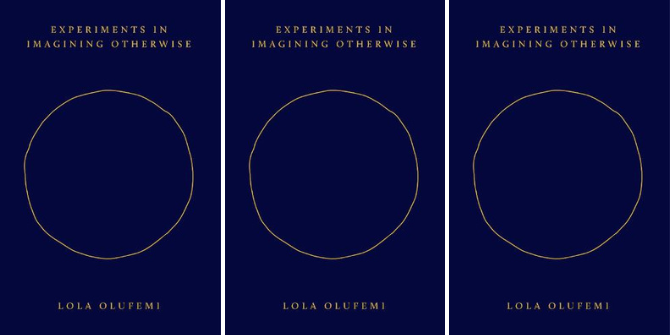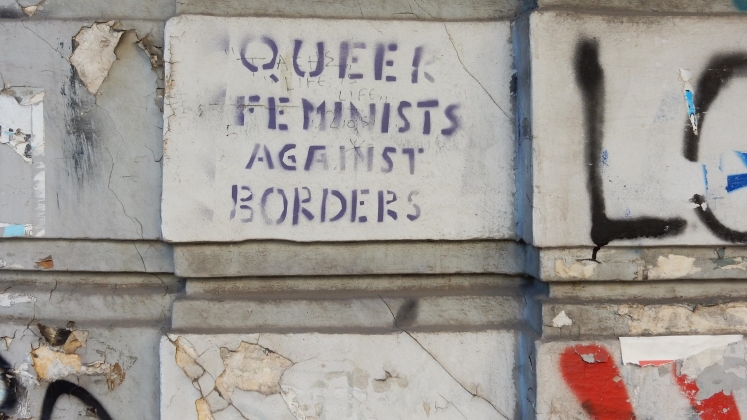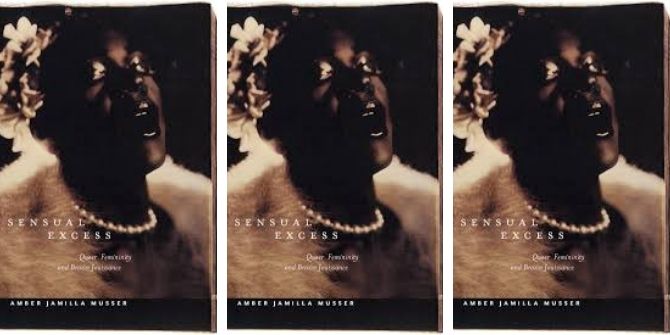In Fugitive Feminism, Akwugo Emejulu probes the concept of humanity through the lens of Black feminist thought (particularly Audre Lorde) and reveals its intrinsic exclusions and biases. Deftly intertwining personal narrative with scholarly discourse, Emejulu advocates for acknowledging erasure and violence embedded in the idea of “humanity” and celebrating Black radical fugitivity, writes Avani Ashtekar.
Fugitive Feminism. Akwugo Emejulu. Silver Press. 2022.
 In Audre Lorde’s powerful collection of essays, Sister Outsider: Essays and Speeches, she wrests oppression from the obvious realm of a lived moment, and connects it to the very state of being. For Lorde, “[…] revolutionary change is never merely the oppressive situations which we seek to escape, but that piece of the oppressor which is planted deep within each of us, and which knows only the oppressors’ tactics, the oppressors’ relationships” (emphasis added). The ontological question that Lorde brings forth, then, does not – and cannot – surpass a mode of oppression that dominates how one lives in this world, or rather exists in it, which is, by being human. Wrestling with this understanding, Akwugo Emejulu’s compact and fearless manifesto Fugitive Feminism heeds Lorde’s and other Black feminists’ call to scrutinise the “oppressor planted deep within each of us” by questioning what it means to be human and more importantly by troubling our appeal and continued affiliation to the “human” as sociopolitical a category.
In Audre Lorde’s powerful collection of essays, Sister Outsider: Essays and Speeches, she wrests oppression from the obvious realm of a lived moment, and connects it to the very state of being. For Lorde, “[…] revolutionary change is never merely the oppressive situations which we seek to escape, but that piece of the oppressor which is planted deep within each of us, and which knows only the oppressors’ tactics, the oppressors’ relationships” (emphasis added). The ontological question that Lorde brings forth, then, does not – and cannot – surpass a mode of oppression that dominates how one lives in this world, or rather exists in it, which is, by being human. Wrestling with this understanding, Akwugo Emejulu’s compact and fearless manifesto Fugitive Feminism heeds Lorde’s and other Black feminists’ call to scrutinise the “oppressor planted deep within each of us” by questioning what it means to be human and more importantly by troubling our appeal and continued affiliation to the “human” as sociopolitical a category.
Vitally, the book tasks itself with asking, why must Black people demand to be recognised as human?
Vitally, the book tasks itself with asking, why must Black people demand to be recognised as human? Such a question is two-pronged: firstly, it brings to the fore the historical contexts wherein Black people, among others, have been systematically excluded from the category of human, and secondly, it troubles the very aspiration to be human.
The human as a category, if not the presumed nucleus of all political activity, has been central to Western enlightenment thinking. For it, the “rational human” is the bearer of universal rights. It is though this promise of inclusive humanity that Civil Rights activists and feminists have demanded substantive rights, indeed, human rights. Why, then, does Emejulu’s manifesto divest from the said “universality” of the human?
that whiteness’ access to the status of human was always-already granted could only be facilitated because racialised people were (and continue to be) disciplined into categories of ‘not-quite-human, and non-human’.
The premise of the book draws from and builds upon scholars of Black feminist studies to illustrate how social relations are globally calibrated by an unwavering interest to sustain racial capitalism which is “upheld by the politics of the human” (32). In her opening chapter, Emejulu sides with thinkers such as Sylvia Wynter, Saidiya Hartman, James Baldwin and Hortense Spillers amongst others by disrobing the “human” from its innocence of inclusivity. Concurring with scholars of Black studies, she effectively demonstrates how the “human” as a descriptor was constructed and construed within a matrix of extreme inequality. To them, that whiteness’ access to the status of human was always-already granted could only be facilitated because racialised people were (and continue to be) disciplined into categories of “not-quite-human, and non-human” (Weheliye, quoted on page 3).
With this theoretical understanding and her experiences as a feminist activist, Emejulu diverges from her forebearers and assertively asks “[w]hat is the point of being political and doing politics in a system that cannot and will not see you as human?” (4). Herein lies the book’s boldest proposal, which is to not only identify the failed promise of human but also the necessity to rebel against it by participating in “an audacious and dangerous act of self-liberation” (36). Her attempt to answer the question above shapes Fugitive Feminism as a work of what may be called political speculation.
Notably, while the speculative tone shines through the book, Emejulu’s reliance on parables from the past and her experiences as a scholar-activist from the present ground Fugitive Feminism. As such, instead of pitching a theoretical argument, Emejulu employs an autobiographical voice. Such a tone not only reiterates that the “personal is political” but also that the “political is personal.”
In doing so and by setting out an ancestral lineage of exclusion and but also resistance, the book seeks to answer another weighty question: why accept and even voluntarily step out of the category of the human, into non-humanity? She insists that her radical acceptance and mourning the eventual divestment from the human is rooted in the recognition that she ought to step out of humanity not solely as a way of rejecting her own humanity but vitally to acknowledge its “self-mythologising” constitution, and thus futility (24).
Wielded more as a political project initiated by a thought experiment and moored in serious engagement with Black studies and feminism, the book only presents possibilities of liberation as a collective endeavour, impossible when constrained by the individuality of the ‘human.’
Given that the aspiration of modern living is moralised in becoming “a better human,” it is as perilous as courageous to ask, “can we think of a self outside of the human?” (30). Not only think, but is it possible to live outside of the circumscription of the human? Emejulu’s book is neither prophetic nor prescriptive. And it does not ask these questions to set out singular concrete answers. Wielded more as a political project initiated by a thought experiment and moored in serious engagement with Black studies and feminism, the book only presents possibilities of liberation as a collective endeavour, impossible when constrained by the individuality of the ‘human.’
The necessity, then, to flee from the dangerously curtailed “human” motivates the book title’s prefix, “fugitive.” To be a fugitive, in Emejulu’s words, is to practice “escapology” (35).
The continuum of captivity dominates contemporary Black experience as racialised people confront imposed immobility in the form of life-threatening borders, documentation statuses, as well as socio-economic immobility. As a political project, then, Emejulu proposes fugitivity as a capacious antidote to a persistent condition of captivity.
Emejulu is quick to contend, however, that escape does not guarantee freedom. Said differently, the book’s facticity lies in establishing that escape is promising but not a promise in and of itself. In an arresting analysis of Colson Whitehead’s novel, The Underground Railroad, Emejulu connects Cora (the protagonist)’s escape from slavery to anti-capitalism. As a fugitive, she writes, Cora, “exists in a liminal state: being underground, undercover and on the margins of life.” Fugitivity, and thus by proxy being in a state of liminality offers Cora both, a “great promise and even greater perils” she adds “one who flees into the unknown is haunted by the possibility of being re-captured, brutalised and obliterated.” The continuum of captivity dominates contemporary Black experience as racialised people confront imposed immobility in the form of life-threatening borders, documentation statuses, as well as socio-economic immobility. As a political project, then, Emejulu proposes fugitivity as a capacious antidote to a persistent condition of captivity.
As the reader moves from one chapter to the next, they are greeted with unanticipated interludes in the form of poetry and passages by numerous authors. These pieces speak with one another as they observe the relationship between unfreedom (ie, captivity) and racism, echoing the book’s deliberations on humanity. This seamless weaving of theoretical writing with “fictional” pieces collapses binary distinctions between scholarly work and non-academic writing. By interweaving other artists’ works with hers, Emejulu is not only situating her thinking within a genealogy of resistance writing, but also making a stylistic decision that breaks free from conventional modes of epistemic production and publication.
Generative for scholars of political science, especially human rights, sociology, and feminist and queer studies, the book will propel readers familiar with Black studies into rethinking the ties between epistemology and ontology.
Fugitive Feminism raises important questions on the implications of taking the human and humanity for granted. Generative for scholars of political science, especially human rights, sociology, and feminist and queer studies, the book will propel readers familiar with Black studies into rethinking the ties between epistemology and ontology. The reading experience of Fugitive Feminism could be enriched further if paired with Katherine McKittrick’s books Sylvia Wynter: On Being Human As Praxis, alongside this playlist she created for an immersive introduction to think and possibly act beyond the human.
Note: This review gives the views of the author and not the position of the LSE Review of Books blog, nor of the London School of Economics and Political Science.
Image credit: cLUMEZIA.com on Shutterstock.







